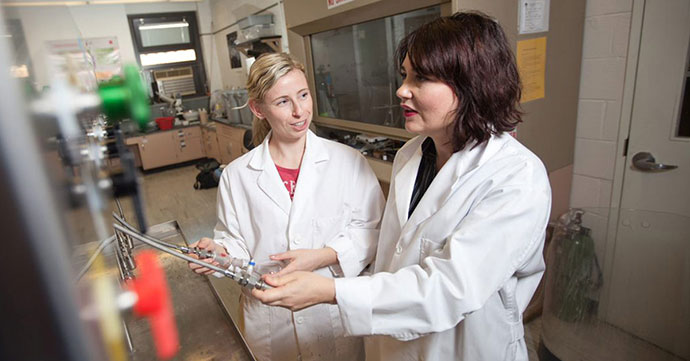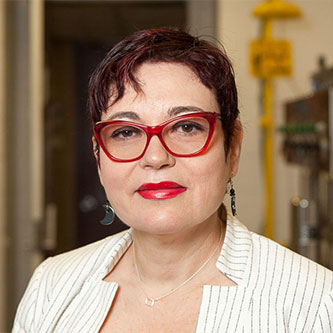News Release - For Immediate Release
Brooklyn College Announces the Opening of New Cancer Center to Address Health Disparities in the Fight Against Cancer
Nov. 1, 2021
News Release - For Immediate Release
Nov. 1, 2021

Research is done at Brooklyn College that will aid in the mission of BCCC-CURE.
Cancer is the second leading cause of death in New York State after heart disease among adults and the second cause of death among children after injuries. And the number of people diagnosed with the disease increases every year.
When looking at the borough of Brooklyn, the mortality rates are ever higher. This is mainly due to health disparities caused by economic status and the fact that people of different ethnicities and countries of origin—including undocumented populations—are less likely to have information and access to prevention, diagnosis, and potential free treatments.
As one of Brooklyn’s largest anchor institutions located in one of the most diverse places in the nation, Brooklyn College of The City University of New York (CUNY) is proud to announce the official launch of the Brooklyn College Cancer Center-BCCC-CURE (CommUnity Outreach, Research and Education). BCCC-CURE’s mission is to enhance the lives of patients affected by cancer with a special focus on underserved Brooklyn residents, while focusing on three main areas: research, education, and community service.
Located at the college’s main campus in the borough’s Midwood neighborhood, the Center was established at Brooklyn College last year. Funding to date for BCCC-CURE is approximately $9 million, which represents seed funding from the Brooklyn College Foundation and individual donors, as well as funds that researchers affiliated with BCCC-CURE have been awarded for cancer and cancer-related research since 2018 from government and foundation sources.
The engine driving BCCC-CURE’s success is the diverse people and partnerships that will serve and empower underserved communities in and around Brooklyn—as well as the diversity of Brooklyn College itself. For the past three years, Brooklyn College has been named the most ethnically diverse campus in the country by U.S. News and World Report.
A cancer survivor herself, Brooklyn College President Michelle J. Anderson is proud that the center will focus on serving underrepresented communities and will educate the next generation of cancer experts.
“No one should have to look outside of Brooklyn for these resources, particularly people in underserved communities. By combining the expertise that already exists at Brooklyn College in cancer research with the leading healthcare facilities in New York, BCCC-CURE will connect these anchor institutions and build relationships to make Brooklyn a leader in cancer research and care,” Anderson said.
The center’s leadership group includes the following faculty members at Brooklyn College: Professor Dr. Maria Contel, director, research area leader and professor of chemistry; Dr. Jennifer Basil, associate director of community outreach and professor of biology; and Dr. Brian Gibney, associate director of education and professor of chemistry.
Since its inception, Brooklyn College scientists reached out to other Cancer Research Centers in the NYC area including National Cancer Institute’s “Designated Cancer Centers,” recognized for their leadership in laboratory and clinical research such as Memorial Sloan Kettering Cancer Center in Manhattan.

Dr. Maria Contel, Director, Research Area Leader and Brooklyn College chemistry professor.
“We wanted a diverse group for the BCCC-CURE advisory board, ideally scientists and physicians from Brooklyn-based centers like SUNY Downstate Medical School, Maimonides Cancer Center, and the NCI Designated Memorial Sloan-Kettering Cancer Center, who had experience working in healthcare disparities or a particular interest in the health of women and people of color,” Contel said. This includes Dr. Carol Brown, the senior vice president, chief health equity officer, and Nicholls-Biondi Chair for Health Equity at Memorial Sloan Kettering Cancer Center, and Dr. Moro Salifu, chair of the Department of Medicine at SUNY Downstate and director of the NIH-funded Brooklyn Health Disparities Center. Dr. Jason Lewis, the Emily Tow Jackson Chair in Oncology at Memorial Sloan Kettering Cancer Center and now a member of the BCCC-CURE advisory board, helped to introduce the BCCC-CURE leadership team to like-minded people in the field.
Lewis believes BCCC-CURE is revolutionary in that it will bring a diverse team of experts together to serve underrepresented communities on so many different levels.
“There is nothing like this in Brooklyn,” Lewis said. “The wealth of research, knowledge and experience, along with the capacity for community outreach and educational opportunities, will allow BCCC-CURE to address health disparities in the fight against cancer. I am excited to be a part of it and help move the effort forward.”
As associate director of education, Brian Gibney’s eye is always on finding opportunities for Brooklyn College students, particularly undergraduates. The professor of chemistry says these may be in-classroom but will more likely be chances for enrichment outside the campus walls. A medical translation course for bilingual undergraduate students in partnership with Memorial Sloan Kettering has been a great success.
“This spring, we had 19 students learning how to interpret and bridge patient-top physician communication in the clinic,” said Gibney. “So, if somebody comes in who speaks Creole as a first language, then a person fluent in the language, who is also trained to interpret and translate medical terms, can explain symptoms and pass other vital information between doctor and patient.”
Students who receive training in medical translation—and Brooklyn College has a student body that speaks more than 90 languages—receive a certificate that can gain them employment in a city of many cultures and ethnicities.
Jennifer Basil, community outreach director, was diagnosed with HER2 positive breast cancer in her 30s. After finding treatment in Brooklyn, she is healthy now and promoting BCCC-CURE is a personal labor of love. She began organizing, in collaboration with BCCC-CURE partners, outreach events, which kicked off this spring. Two recent events included a screening by Jody Steinhardt, coordinator of the Lung Cancer Screening at Maimonides, and a seminar for students on cervical cancer, which, Basil noted, is rising in younger people.
The center also held a half-day symposium with Maimonides on colorectal cancer. The larger vision for BCCC-CURE is to expand outreach by informing communities about access to clinical trials and creating partnerships with hospitals that are looking for diversity in their populations for those trials. Partnering with healthcare professionals and community leaders who are trusted is critical. A series of seminars, lectures, and outreach events have also been held online for the community, students, and the extended Brooklyn College family.
Twenty-five faculty members are focused on cancer and cancer-related research at BCCC-CURE in one of three main areas: the biology and biochemistry of cancer, the underlying mechanisms of the disease, and drug development and delivery systems. Contel said the center is already developing potential drugs for different types of cancer or delivery systems for FDA-approved drugs.
Researchers are using some compounds developed at Brooklyn College as potential probes and biomarkers to identify biological targets and develop improved cancer treatments.
Contel, an organometallic chemist, has already successfully used metal-based compounds to combat different types of cancer and holds a patent for gold-and titanium compounds used to battle renal cancer. She holds a second patent for a ruthenium-based compound that will help fight triple-negative breast cancer, a tough one that does not respond to traditional treatments. Contel was also part of a multi-institutional research team that has designed nanoparticles that can communicate with and slow the development of cancer cells. The work — detailed in a newly published paper in the science journal “Advanced Materials” — has uncovered a novel framework for the potential development of drug-free cancer therapies. Fellow CUNY professor Dr. Rein V. Ulijn was the principal investigator for the paper and graduate student Richard Huang and doctoral student Nazia Nayeem were among others who contributed to the work.
Several other Brooklyn College-based researchers from the center also hold patents for potential treatments for cancer or related diseases: Ph.D. chemistry professors Alec Greer has a patent on a singlet oxygen device for destruction of pathogens; Peter Lipke has one on preventing biofilms (including cancer-associated fungal infections); and Professor Ryan Murelli has a patent on compounds to treat hepatitis B.
Part of the work carried out by these and other BCCC-CURE researchers is done in collaboration with many prestigious institutions in the United States and abroad.
“In the Chemistry Department we are developing potential drugs for different types of cancer or delivery systems for FDA-approved drugs,” said Contel, explaining that they have done a lot of research on nanocarriers, microscopic materials used to transport a substance more safely such as a drug through the body. This work has the potential to revolutionize chemotherapy and was also used to develop the COVID-19 vaccine. The third area of research at BCCC-CURE is more outward-facing and patient-oriented.
“We have a computer scientist who is interested in doing an analysis of large data related to cancer patients and we have three faculty members from the psychology department who have projects they are working on for patients of other diseases that could be easily translated into research benefiting cancer patients,” said Contel.
“We also plan on supporting researchers in other diseases. Many are connected, there are a lot of comorbidities. Recently the outcomes for cancer patients with COVID-19 have been terrible because they had to delay care.”
To read more about BCCC-CURE, read this story from Brooklyn College Magazine.
Press contact: Rich Pietras, 718.951.5000 x6350 | richard.pietras@brooklyn.cuny.edu